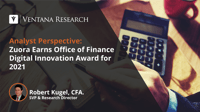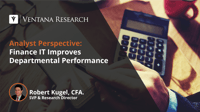Environmental, social and governance reporting by public corporations has become a top-of-mind issue for senior executives and boards of directors as countries increasingly consider or mandate its implementation in some form. The fundamental rationale for ESG reporting is rooted in the inability of purely financial measures to capture externalities (such as greenhouse gas emissions) or provide metrics that enable an objective assessment of management’s ability to properly determine trade-offs...
Read More
Topics:
Human Capital Management,
Office of Finance,
Business Intelligence,
Data Governance,
Data Preparation,
Data,
Financial Performance Management,
ERP and Continuous Accounting
The annual Ventana Research Digital Innovation Awards showcase advances in the productivity and potential of business applications, as well as technology that contributes significantly to the improved processes and performance of an organization. Our goal is to recognize technology and vendors that have introduced noteworthy digital innovations to advance business and IT.
Read More
Topics:
Sales,
Office of Finance,
Digital Commerce,
ERP and Continuous Accounting,
Subscription Management
A year of business uncertainty, lockdowns and operational disruptions forced finance and accounting organizations to adapt and change in many ways that are proving to be permanent. The need to operate virtually resulted in some organizations accelerating their adoption of technology, bringing them closer to achieving a transformation of the finance and accounting function: reshaping the department into an organization that is more forward-looking and strategic. Strategic in the sense of...
Read More
Topics:
Office of Finance,
Business Intelligence,
Data Governance,
Data Preparation,
Business Planning,
Financial Performance Management,
ERP and Continuous Accounting,
blockchain,
robotic finance,
Predictive Planning,
AI & Machine Learning













